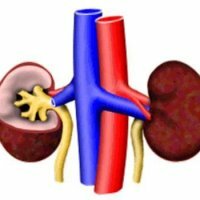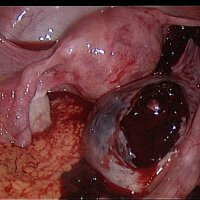Acute Renal Failure

Acute renal failure is a rapid loss of renal function that occurs suddenly. The determination of this condition allows timely treatment of acute renal failure before it becomes permanent.
Renal failure is one of the conditions caused by impaired renal function, preventing the normal excretion of waste products from the body. Usually this is a chronic disease, which is called chronic kidney failure. Acute failure in the work of the kidneys arises as a result of the potentially dangerous accumulation of fluid and waste in the body.
Acute failure is due to conditions of kidney damage or impairment in the process of waste filtration. It can occur as a result of diseases of the bladder or ureter, heart problems, low blood pressure, kidney infection, low blood volume and a decrease in blood flow to the kidneys.
Symptoms of acute insufficiency
Initial symptoms of kidney failure appear quickly. Fever, pain, chills, vomiting, persistent urination, pain when urinating or blood in the urine are the initial signs of kidney infection
Renal failure in acute form occurs suddenly and may beIs caused by infection, trauma, serious surgery, drugs or some types of toxins. One of the first signs of this form of renal failure is a sharp decrease or complete cessation of urination. Other symptoms include fluid retention, swelling, which appear on the ankles, legs and feet, confusion, bloody stools, fatigue, side pain, hand tremors, increased blood pressure, loss of sensitivity, appetite, and metallic taste in the mouth.
Back pain
Renal failure causes back pain. This pain should not be confused with pain in the lower back. Acute pain occurs around the waist in the form of short pulsating seizures or constant pain.
Symptoms and symptoms of
Symptoms and symptoms of this disease include fatigue, dyspnea, decreased diuresis, drowsiness, confusion, convulsions, fluid retention and to whom.
Diagnostics
Blood tests and instrumental research methods are used to diagnose acute renal failure. Abnormal levels of creatinine, blood urea nitrogen( AMC) and electrolytes indicate renal dysfunction. Ultrasound, MRI and computed tomography( CT) create images of the kidneys that can show damage to the structure of these organs.
Treatment of
At the first sign of this disease, you need to get advice from a medical facility. The level of potassium should be monitored. Excess potassium in the blood can cause a worsening of the disease. Reduce the consumption of products containing potassium( cabbage, strawberries, beans).A doctor can prescribe a diuretic to get rid of excess fluid.
Acute kidney failure is often treated with hemodialysis, which removes liquid and waste from the blood. During this process, blood is removed from the body, filtered and returned to the body. Treatment of the underlying disease that caused kidney damage is also of great importance in eliminating acute renal failure.
Acute form of kidney failure is a potentially dangerous condition for life, which without immediate assistance can lead to death, damage to the heart and nervous system, or damage to other organs and systems due to accumulation of toxins in the blood.
Depending on the cause of the onset of acute renal failure, treatment may include antibiotics to prevent infection, diuretics, to increase urination, to help the kidneys wash out toxins.
Timely appropriate therapy and treatment under the supervision of medical personnel can prevent further damage to the kidneys and restore their normal functioning in the future.
Treatment can last from a few weeks to several months.



